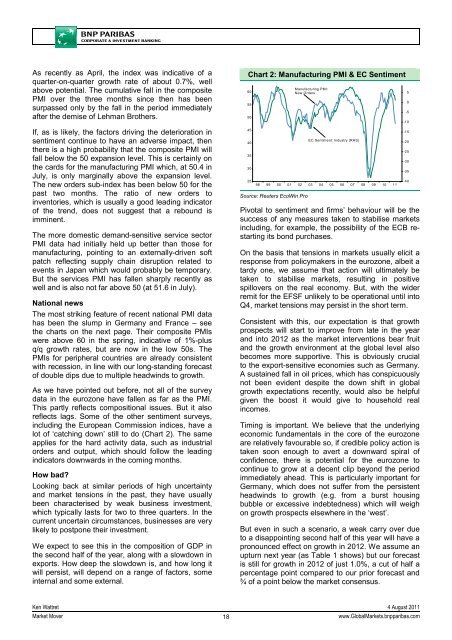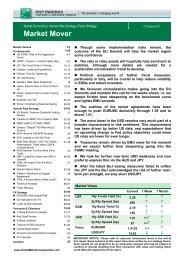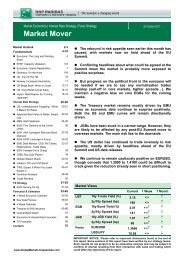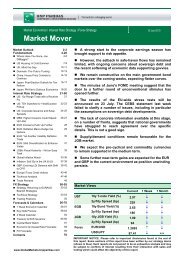MARKET MOVER - BNP PARIBAS - Investment Services India
MARKET MOVER - BNP PARIBAS - Investment Services India
MARKET MOVER - BNP PARIBAS - Investment Services India
Create successful ePaper yourself
Turn your PDF publications into a flip-book with our unique Google optimized e-Paper software.
As recently as April, the index was indicative of a<br />
quarter-on-quarter growth rate of about 0.7%, well<br />
above potential. The cumulative fall in the composite<br />
PMI over the three months since then has been<br />
surpassed only by the fall in the period immediately<br />
after the demise of Lehman Brothers.<br />
If, as is likely, the factors driving the deterioration in<br />
sentiment continue to have an adverse impact, then<br />
there is a high probability that the composite PMI will<br />
fall below the 50 expansion level. This is certainly on<br />
the cards for the manufacturing PMI which, at 50.4 in<br />
July, is only marginally above the expansion level.<br />
The new orders sub-index has been below 50 for the<br />
past two months. The ratio of new orders to<br />
inventories, which is usually a good leading indicator<br />
of the trend, does not suggest that a rebound is<br />
imminent.<br />
The more domestic demand-sensitive service sector<br />
PMI data had initially held up better than those for<br />
manufacturing, pointing to an externally-driven soft<br />
patch reflecting supply chain disruption related to<br />
events in Japan which would probably be temporary.<br />
But the services PMI has fallen sharply recently as<br />
well and is also not far above 50 (at 51.6 in July).<br />
National news<br />
The most striking feature of recent national PMI data<br />
has been the slump in Germany and France – see<br />
the charts on the next page. Their composite PMIs<br />
were above 60 in the spring, indicative of 1%-plus<br />
q/q growth rates, but are now in the low 50s. The<br />
PMIs for peripheral countries are already consistent<br />
with recession, in line with our long-standing forecast<br />
of double dips due to multiple headwinds to growth.<br />
As we have pointed out before, not all of the survey<br />
data in the eurozone have fallen as far as the PMI.<br />
This partly reflects compositional issues. But it also<br />
reflects lags. Some of the other sentiment surveys,<br />
including the European Commission indices, have a<br />
lot of ‘catching down’ still to do (Chart 2). The same<br />
applies for the hard activity data, such as industrial<br />
orders and output, which should follow the leading<br />
indicators downwards in the coming months.<br />
How bad?<br />
Looking back at similar periods of high uncertainty<br />
and market tensions in the past, they have usually<br />
been characterised by weak business investment,<br />
which typically lasts for two to three quarters. In the<br />
current uncertain circumstances, businesses are very<br />
likely to postpone their investment.<br />
We expect to see this in the composition of GDP in<br />
the second half of the year, along with a slowdown in<br />
exports. How deep the slowdown is, and how long it<br />
will persist, will depend on a range of factors, some<br />
internal and some external.<br />
Chart 2: Manufacturing PMI & EC Sentiment<br />
60<br />
55<br />
50<br />
45<br />
40<br />
35<br />
30<br />
25<br />
98 99 00 01 02 03 04 05 06 07 08 09 10 11<br />
Source: Reuters EcoWin Pro<br />
Manufacturing PMI:<br />
New Orders<br />
EC Sentiment: Industry (RHS)<br />
Pivotal to sentiment and firms’ behaviour will be the<br />
success of any measures taken to stabilise markets<br />
including, for example, the possibility of the ECB restarting<br />
its bond purchases.<br />
On the basis that tensions in markets usually elicit a<br />
response from policymakers in the eurozone, albeit a<br />
tardy one, we assume that action will ultimately be<br />
taken to stabilise markets, resulting in positive<br />
spillovers on the real economy. But, with the wider<br />
remit for the EFSF unlikely to be operational until into<br />
Q4, market tensions may persist in the short term.<br />
Consistent with this, our expectation is that growth<br />
prospects will start to improve from late in the year<br />
and into 2012 as the market interventions bear fruit<br />
and the growth environment at the global level also<br />
becomes more supportive. This is obviously crucial<br />
to the export-sensitive economies such as Germany.<br />
A sustained fall in oil prices, which has conspicuously<br />
not been evident despite the down shift in global<br />
growth expectations recently, would also be helpful<br />
given the boost it would give to household real<br />
incomes.<br />
Timing is important. We believe that the underlying<br />
economic fundamentals in the core of the eurozone<br />
are relatively favourable so, if credible policy action is<br />
taken soon enough to avert a downward spiral of<br />
confidence, there is potential for the eurozone to<br />
continue to grow at a decent clip beyond the period<br />
immediately ahead. This is particularly important for<br />
Germany, which does not suffer from the persistent<br />
headwinds to growth (e.g. from a burst housing<br />
bubble or excessive indebtedness) which will weigh<br />
on growth prospects elsewhere in the ‘west’.<br />
But even in such a scenario, a weak carry over due<br />
to a disappointing second half of this year will have a<br />
pronounced effect on growth in 2012. We assume an<br />
upturn next year (as Table 1 shows) but our forecast<br />
is still for growth in 2012 of just 1.0%, a cut of half a<br />
percentage point compared to our prior forecast and<br />
¾ of a point below the market consensus.<br />
5<br />
0<br />
-5<br />
-10<br />
-15<br />
-20<br />
-25<br />
-30<br />
-35<br />
-40<br />
Ken Wattret 4 August 2011<br />
Market Mover<br />
18<br />
www.GlobalMarkets.bnpparibas.com
















